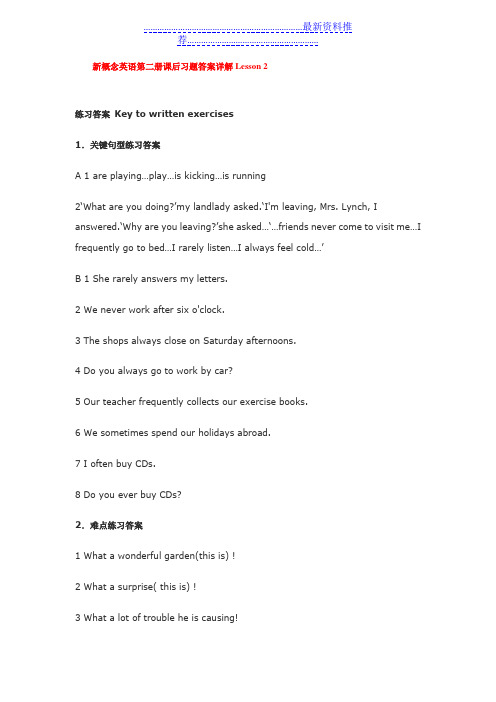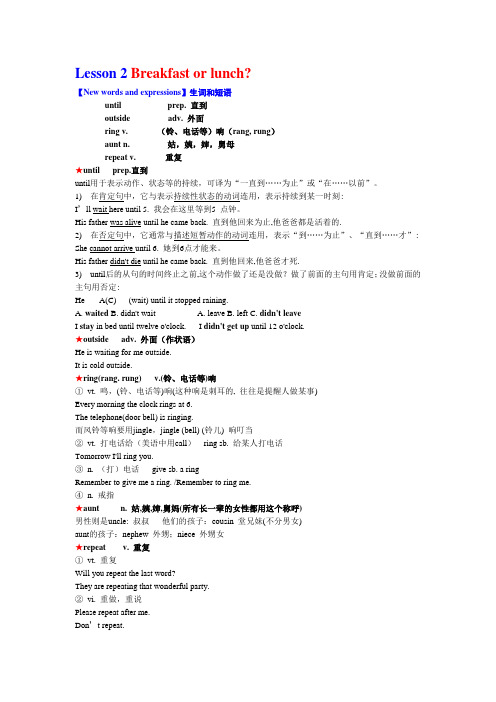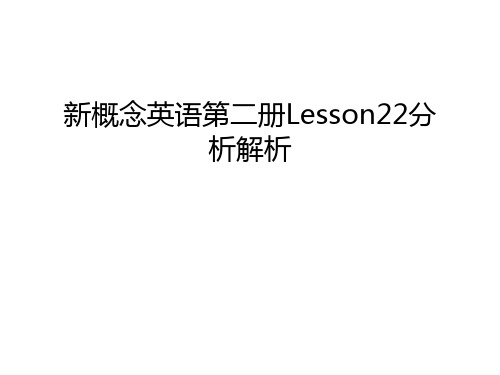新概念英语第二册L22分析解析
- 格式:pdf
- 大小:2.03 MB
- 文档页数:16

新概念英语第二册课后练习答案l e s s o n22新概念英语第二册课后习题答案详解Lesson 22练习答案 Key to written exercises1.关键句型练习答案1 from2 on3 in4 on5 from6 from7 of8 on9 from 10 in11 on…in 12 of 13 in 14 on 15 of16 of 17 from 18 of…on 19 on 20 of…of21 of 22 of/from 23 of 24 from 25 in2 6on 27 on 28 from 29 on 30 in31 from 32 on 33 on 34 on 35 in36 from 37 on 38 on 39 in 40 of41 on 42 on 43 of 44 in 45 in46 in 47 from 48 of 49 of 50 of51 on 52 of 53 from 54 in2.多项选择题答案1. d根据课文第4-5行She threw the bottle into the sea. She never thought of it again, 只有d. She didn’t expect anyone to find the bottle 是课文所暗示的内容,其他3个选择都不符合课文实际内容。
2. b根据课文第6行Both girls write to each other regularly now, 只有b. correspond in the normal way now 与课文实际内容相符合,correspond=write to each other, 其他3个选择都不是课文提及的内容。
3. d本句中的动词dreamed(梦想) 可以同介词of 或about连用,也可以跟that引导的从句做宾语,但不能跟动词不定式。
a. to receive 是动词不定式,不合乎语法;b. to receiving 有语法错误,应该是dream of receiving; c. of receive 有语法错误,应该是of receiving; d. that she would receive 是that 引导的从句,可以做dreamed 的宾语,因此应该选d.4. d只有d. the same age as(与……年龄相同)之处是正确的表达方式;而a. the same age with 不符合语法,same 不应该同with 连用,而应该同as连用;b. the same age 后面缺as, 不正确;c. as old 后面也应该有as 才符合语法。

新概念21课课文Why do people think the writer is mad?Aeroplanes are slowly driving me mad. I live near an airport and passing planes can be heard night and day. The airport was built years ago, but for some reason it could not be used then. Last year, however, it came into use. Over a hundred people must have been driven away from their homes by the noise. I am one of the few people left. Sometimes I think this house will be knocked down by a passing plane.I have been offered a large sum of money to go away, but I am determined to stay here. Everybody says I must be mad and they are probably right.Key words and expressionsdrive sb. mad 使某人发疯passing adj.过往的night and day 日夜不停的come into use 开始被使用knock down 撞倒be determined to do sth.offer vt 提供,开价可跟双宾语同giveLanguage points一drivedrive sb. crazy/insane 使某人发疯①Over a hundred people must have been driven away from their homes by the noise. drive away 把…赶走②I was driven by my curiosity to look into the window. 驱使③what are you driving at? 说明…二for some reason 由于某种原因for one reason or another 由于这样或那样的原因for various reasons 由于各种原因for different reasons 由于不同的原因三come into use 开始被使用when did the bank note come into use?=> be out of use 不再被使用that telephone is out of use now.四I am one of the few people left. Few :少数, 比a few 的数量还要少.Very few people know this. There is nothing left. Left 剩下来的五be determined to do sth. 下定决心做某事=decide to doDetermined 下定决心的坚定的Key structure 被动语态文中划线部分加by强调动作执行者,可省略. 可翻译成有人…1.何时运用被动语态:(1)强调动作的接受者:America was discovered by Columbus.(2)不知谁是动作的执行者:You are wanted on the phone.(3)作客观说明:It is said that the meeting has been put off.(经典句型)2.主动变被动的基本方法:(说起来容易,掌握起来需要用心!)(1)主动语态中的宾语变为被动语态的主语。

新概念英语第二册课后练习答案l es s o n2 2新概念英语第二册课后习题答案详解Lesson 22练习答案Key to written exercises1 from2 on3 in4 on5 from6 from7 of8 on9 from 10 in 11 on … -in 12 of 13 in 14 on 15 o16 of 17 from 18of…on 19 on21 of 22 of/from 23 of 24 from 25 in2 6on 27 on 28 from 29 on 30 in31 from 32 on 33 on 34 on 35 in36 from 37 on 38 on 39 in 40 of41 on 42 on 43 of 44 in 45 in46 in 47 from 48 of 49 of 50 of51 on 52 of 53 from 54 in1•关键句型练习答案2 •多项选择题答案20 of …of1. d根据课文第4-5 行She threw the bottle into the sea. She never thought of it again,只有d. She didn ' t expect anyone to find the bottle是课文所暗示的内容,其他3个选择都不符合课文实际内容。
2. b根据课文第 6 行Both girls write to each other regularly now, 只有 b.corresp ond in the no rmal way now 与课文实际内容相符合,corresp on d=write to each other,其他3个选择都不是课文提及的内容。
3. d本句中的动词dreamed(梦想)可以同介词of或about连用,也可以跟that弓I 导的从句做宾语,但不能跟动词不定式。

新概念英语第二册课后习题答案详解Lesson 2练习答案Key to written exercises1.关键句型练习答案A 1 are playing…play…is kicking…is running2‘What are you doing?’my landlady asked.‘I'm leaving, Mrs. Lynch, I answered.‘Why are you leaving?’she asked...‘...friends never come to visit me (I)f requently go to bed…I rarely listen…I always feel cold…’B 1 She rarely answers my letters.2 We never work after six o'clock.3 The shops always close on Saturday afternoons.4 Do you always go to work by car?5 Our teacher frequently collects our exercise books.6 We sometimes spend our holidays abroad.7 I often buy CDs.8 Do you ever buy CDs?2.难点练习答案1 What a wonderful garden(this is) !2 What a surprise( this is) !3 What a lot of trouble he is causing!4 What wonderful actors (they are) !5 What a hard-working woman (she is) !6 What a tall building (it is) !7 What a terrible film (it is) !8 What a clever boy you are!9 What a pretty girl (she is) !10 What a strange guy (he is) !3.多项选择题答案1. c因为根据课文内容,作者正在吃早饭,他不可能在床上。

Lesson 2 Breakfast or lunch?【New words and expressions】生词和短语until prep. 直到outside adv. 外面ring v. (铃、电话等)响(rang, rung)aunt n. 姑,姨,婶,舅母repeat v. 重复★until prep.直到until用于表示动作、状态等的持续,可译为“一直到……为止”或“在……以前”。
1) 在肯定句中,它与表示持续性状态的动词连用,表示持续到某一时刻:I’ll wait here until 5. 我会在这里等到5 点钟。
His father was alive until he came back. 直到他回来为止,他爸爸都是活着的.2) 在否定句中,它通常与描述短暂动作的动词连用,表示“到……为止”、“直到……才”: She cannot arrive until 6. 她到6点才能来。
His father didn't die until he came back. 直到他回来,他爸爸才死.3) until后的从句的时间终止之前,这个动作做了还是没做?做了前面的主句用肯定;没做前面的主句用否定:He ___A(C)___(wait) until it stopped raining.A. waitedB. didn't wait A. leave B. leftC. didn't leaveI stay in bed until twelve o'clock. I didn't get up until 12 o'clock.★outside adv. 外面(作状语)He is waiting for me outside.It is cold outside.★ring(rang. rung) v.(铃、电话等)响①vt. 鸣,(铃、电话等)响(这种响是刺耳的, 往往是提醒人做某事)Every morning the clock rings at 6.The telephone(door bell) is ringing.而风铃等响要用jingle,jingle (bell) (铃儿) 响叮当②vt. 打电话给(美语中用call)ring sb. 给某人打电话Tomorrow I'll ring you.③n. (打)电话give sb. a ringRemember to give me a ring. /Remember to ring me.④n. 戒指★aunt n. 姑,姨,婶,舅妈(所有长一辈的女性都用这个称呼)男性则是uncle: 叔叔他们的孩子:cousin 堂兄妹(不分男女)aunt的孩子:nephew 外甥;niece 外甥女★repeat v. 重复①vt. 重复Will you repeat the last word?They are repeating that wonderful party.②vi. 重做,重说Please repeat after me.Don’t repeat.【Text】It was Sunday. I never get up early on Sundays. I sometimes stay in bed until lunchtime. Last Sunday I got up very late. I looked out of the window. It was dark outside. 'What a day!' I thought. 'It's raining again.' Just then, the telephone rang. It was my aunt Lucy. 'I've just arrived by train,' she said. 'I'm coming to see you.''But I'm still having breakfast,' I said.'What are you doing?' she asked.'I'm having breakfast,' I repeated.'Dear me,' she said. 'Do you always get up so late? It's one o'clock!'参考译文:那是个星期天, 而在星期天我是从来不早起的, 有时我要一直躺到吃午饭的时候. 上个星期天, 我起得很晚. 我望望窗外, 外面一片昏暗. “鬼天气!”我想, “又下雨了. ”正在这时, 电话铃响了. 是我姑母露西打来的. “我刚下火车, ”她说, “我这就来看你. ”“但我还在吃早饭。

新概念英语第二册新版(L1~L5)课文解析(自学必备)Lesson 1 A private conversation1、Last week I went to the theatre.动词go的原义是离开一个地方去另一个地方,与介词to连用后,常加上主语所要去的目的来代表主语的动作目的。
go to the +地点表示去某地干嘛go to the theatre = go to the theatre to see a play去剧场看戏go to the cinema =see a film 去电影院看电影go to the dairy 去牛奶店go to the + 人 + 's 表示去这个人开的店go to the doctor's 去看病;go to the butcher's 买肉以下短语中名词前不加冠词:go to school 去上学;go to church 去做礼拜;go to hospital(医院) 去看病;go to bed 上床,睡觉;go home(跟home相连一定表示没有事情可做,回家休息)I am at home. 在家休息2、I had a very good seat.seat一般指戏院、汽车等配置的固定座位,也可以抽象地表示“座位”或“位子”等概念。
the front seat of a car 汽车的前座Take a seat, please. 请坐。
3、I did not enjoy it.enjoy vt. 欣赏,享受,喜爱① enjoy +n. 喜欢,从当中得到一种享受(后面不能跟人)I enjoy the music.enjoy the dinner/film/program/game② enjoy oneself/代词玩的开心We always enjoy ourselves.③ enjoy +动名词Jane doesn’t enjoy swimming. She enjoys going to the theatre.4、I got very angry.get在这里有“逐渐变得”的含义,接近become,是个表示过程的动词,表示状态的变化。
【导语】新概念英语⼀共144课。
整本书⽆论是语法还是词汇,题材还是语句,都有其出彩之处。
正是因为如此,新概念英语更是经久不衰,深受⼴⼤英语学习者的喜爱。
为您整理了“新概念英语第2册逐句精讲Lesson22~24”,希望可以帮助到您!新概念英语第2册逐句精讲Lesson22 1、My daughter, Jane,never dreamed of receiving a letter from a girl of her own age in Holland . 我的⼥⼉简从未想到过会收到荷兰的⼀位同龄⼥孩的来信! 语⾔点1 Jane是my daughter的同位语。
语⾔点2 dream of为固定搭配。
语⾔点3 表⽰年龄:a girl of:..(参考Lesson 17)。
本句中这个短语还可⽤the same...as代替:a girl of her own age = the girl who is the same age as Jane。
2、Last year, we were traveling across the Channel and Jane put a piece of paper with her name and address on it intoa bottle. 去年,当我们横渡英吉利海峡时,简把写着她名字和住址的⼀张纸条装进了⼀只瓶⼦。
语⾔点1 were traveling across (当时)正穿越,(当时)横渡 语⾔点2 put a piece of paper with her name中,with意为“具有,带有”(表伴随),相当于 together with,起修饰作⽤:Yesterday I saw a pretty girl with a big / wide mouth. 昨天我看见了⼀个⼤嘴美⼥。
翻译以下短语: ⼀张有弹簧和床整的床→a bed with springs and mattress ⼀位抱着⼩狗的⼥⼠→a lady with a dog in her arms ⼀位左⼿拿着⾬伞的先⽣→a gentleman with an umbrella in his left hand 3、She threw the bottle into the sea. 她把瓶⼦扔进了⼤海。
新概念第二册L12复习要点一、词汇要点:1.luck->lucky->unluckyGood luck to you!/I wish you good luck!You are a lucky dog!/How lucky you are!/It’s lucky for you to get the present!/I missed the train and I was unlucky .rain---rainy cloud--cloudy snow---snowy wind---windysleep---sleepy sun---sunny2.captainHe’s the captain of the ship.3.sail->sailorThe ship will sail to New York harbour.He has been a sailor for 20 years.他当水手已经二十年了。
visit---visitor act---actor4.be proud ofI am proud of you,son.5.important->unimportant->importanceThis meeting is of great importance.This meeting is important.Don’t bother me with unimportant things.不重要的事不要麻烦我。
I hope you realize the importance of this.我希望你意识到这件事的重要性。
二、短语要点:be+adverbbe back----I’ll be back in 5 minutes.be away----He has been away for 2 months.be over----The movie was over 2 minutes ago.be in/out----I wasn’t in when you visited.I was out for dinner with my friends.be on------Nothing interesting is on at the cinema at present.be up to------I think Francis will be up to the job.set out/off/upWe’ll set out for Hangzhou in two days.They set off early in the morning.She set up a new world record.plenty of time=enough timetake part in 参加early in the morninglate in the morning/early in the afternoon/late in the afternoon三.语法要点:定语从句1. Our neighbour will sail tomorrow.His name is Charles Alison..Our neighbour,whose name is Charles Alison, will sail tomorrow.2.His boat is famous.The name of his boat is Topsail.His boat, the name of which is Topsail,is famous.。